Fleurs du Mal Magazine


Or see the index
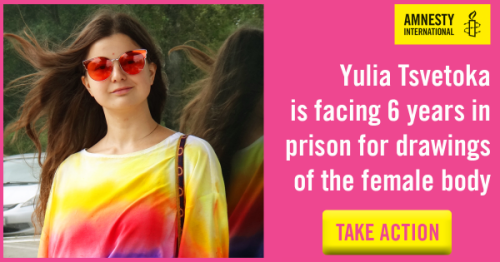
Russian activist and artist, Yulia Tsvetkova, is facing prosecution and harassment for defending women’s and LGBTI rights.
She has been under house arrest since 22 November, under absurd charges of “production and dissemination of pornography” for her drawings of the female body. She is facing up to six years in prison if convicted. Yulia Tsvetkova is a prisoner of conscience and must be immediately and unconditionally released.
Yulia Tsvetkova is an LGBTI and women’s rights activist, artist and stage director, from Komsomolsk-on-Amur, the Russian Far East.
She was detained on 20 November 2019 and put on house arrest two days later, after being charged with the “production and dissemination of pornographic materials”, for making body positive drawings of the female body and sharing them on social media.
Her drawings included pictures of female reproductive organs, and she shared them online as part of her women’s empowerment campaign.
On the day of her arrest, police searched Yulia’s apartment and the children’s educational club where she worked previously. The police seized her electronic devices, documents, and brochures on gender issues. Yulia later said that during the search police officers referred to her as a “lesbian, sex trainer and propagandist leader”.
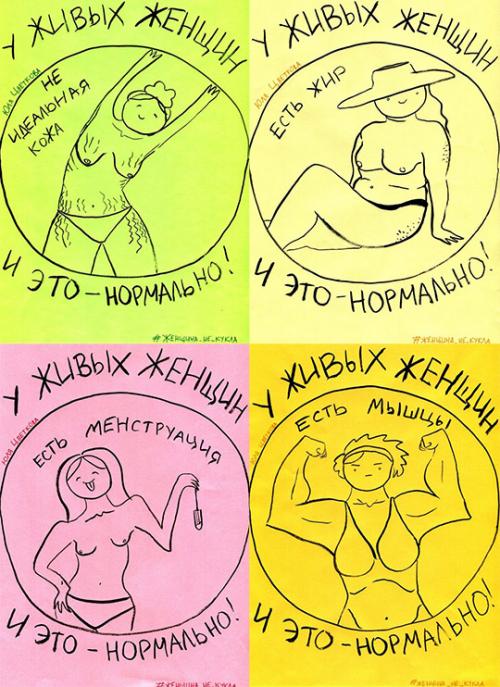
Yulia has been the target of an overtly homophobic campaign since March 2019, when she was forced to leave Merak, the amateur youth theatre company she worked at, after police launched an investigation into alleged “propaganda of non-traditional sexual relations among minors”.
The investigation was launched in reaction to Yulia’s anti-bullying, anti-discrimination play, Blue and Pink.
On 11 December 2019 Yulia was found guilty of “propaganda of non-traditional sexual relations among minors”, and fined 50,000 rubles (approximately 600 GBP), for serving as the administrator of two LGBTI online communities on the popular Russian social media site, VKontakte.
Both of the online communities were properly marked as “18+”, as required by Russian law. Even under the confines of the homophobic Russian “gay propaganda” legislation, the “offence” should only be valid if the “propaganda” material is targeted at people under the age of 18.
 On 17 January, Yulia informed the media that new proceedings had been opened against her, under the same Article of the Code of Administrative Offences that she had previously been charged under. This time she was being prosecuted for posting a drawing she made depicting two same-sex couples with child on social media, alongside the statement, “Family is where love is. Support LGBT+ families”.
On 17 January, Yulia informed the media that new proceedings had been opened against her, under the same Article of the Code of Administrative Offences that she had previously been charged under. This time she was being prosecuted for posting a drawing she made depicting two same-sex couples with child on social media, alongside the statement, “Family is where love is. Support LGBT+ families”.
She published the drawing in support of a same-sex couple who were forced to flee Russia with their adopted children after authorities threatened to remove their children from their custody.
# visit Website Amnesty International UK for more information and urgent actions
# support amnesty international
# take urgent action now
• fleursdumal.nl magazine
More in: Archive S-T, Art & Literature News, AUDIO, CINEMA, RADIO & TV, Illustrators, Illustration, LGBT+ (lhbt+), MUSEUM OF PUBLIC PROTEST, PRESS & PUBLISHING, REPRESSION OF WRITERS, JOURNALISTS & ARTISTS, THEATRE, Urban Art
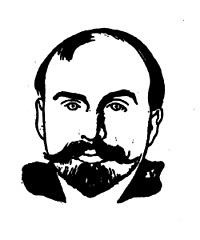
Ta fine bouche est un fil rose…
Ta fine bouche est un fil rose
Tendu sur un masque de soie,
Ta chevelure qui s’éploie,
Est-ce un arc-en-ciel qui se pose?
Tes yeux noirs ont un coeur vermeil
Pailleté d’or et de rubis,
Ce sont deux boucliers fourbis
Avec des gouttes de soleil.
Ton souple corps est une tige
Flexible d’aubépine blanche,
Le svelte ruban de la branche
D’une liane qui voltige.
Tes seins crémeux sont deux cocons
Pomponnés de satin grenat,
Avec deux bourgeons d’incarnat
Crevant la neige des flocons.
Ton ventre comme une cuirasse
Couverte de moire argentée
D’une javeline plantée
A son coeur garde la trace.
Tes deux mains sont les coques d’or
D’une grenade au sein creusé
Où brille d’un éclat rosé
Le chapelet des grains qui dort.
Ta fine bouche est un fil rose
Tendu sur un masque de moire;
Au coeur d’une houppette noire,
C’est un calice qui repose.
Ces deux gouttelettes de pluie
Qu’un nuage pleura pour toi,
Ta petite main les essuie:
Mon coeur, je veux savoir pourquoi.
Ce n’est qu’une gaminerie:
Il ne faut pas pleurer, mon coeur;
Ne pleure pas, ô ma chérie –
La pluie est un amant moqueur.
Elle aime les plantes, et tresse
Le tercet du trèfle en quatrain,
Et sous son humide caresse
Fait craquer le corset du grain.
Elle aime les arbres, et tisse
Aux vieux de moussus corselets,
Aux jeunes une robe lisse
Pour draper leurs bras maigrelets.
Marcel Schwob
(1867-1905)
Ta fine bouche est un fil rose…
Portrait: Félix Vallotton
• fleursdumal.nl magazine
More in: Archive S-T, Archive S-T, Félix Vallotton, Marcel Schwob
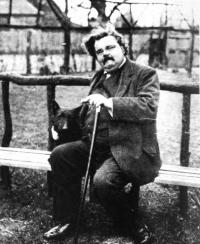
Nightmare
The silver and violet leopard of the night
Spotted with stars and smooth with silence sprang;
And though three doors stood open, the end of light
Closed like a trap; and stillness was a clang.
Under the leopard sky of lurid stars
I strove with evil sleep the hot night long,
Dreams dumb and swollen of triumphs without wars,
Of tongueless trumpet and unanswering gong.
I saw a pale imperial pomp go by,
Helmet and hornèd mitre and heavy wreath;
Their high strange ensigns hung upon the sky
And their great shields were like the doors of death.
Their mitres were as moving pyramids
And all their crowns as marching towers were tall;
Their eyes were cold under their carven lids
And the same carven smile was on them all.
Over a paven plain that seemed unending
They passed unfaltering till it found an end
In one long shallow step; and these descending
Fared forth anew as long away to wend.
I thought they travelled for a thousand years;
And at the end was nothing for them all,
For all that splendour of sceptres and of spears,
But a new step, another easy fall.
The smile of stone seemed but a little less,
The load of silver but a little more:
And ever was that terraced wilderness
And falling plain paved like a palace floor.
Rust red as gore crawled on their arms of might
And on their faces wrinkles and not scars:
Till the dream suddenly ended; noise and light
Loosened the tyranny of the tropic stars.
But over them like a subterranean sun
I saw the sign of all the fiends that fell;
And a wild voice cried “Hasten and be done,
Is there no steepness in the stairs of hell?”
He that returns, He that remains the same,
Turned the round real world, His iron vice;
Down the grey garden paths a bird called twice,
And through three doors mysterious daylight came.
Gilbert Keith Chesterton
(1874 – 1936)
Nightmare
• fleursdumal.nl magazine
More in: Archive C-D, Archive C-D, Chesterton, Gilbert Keith, G.K. Chesterton
A luminous new collection from Keetje Kuipers, All Its Charms is a fearless and transformative reckoning of identity.
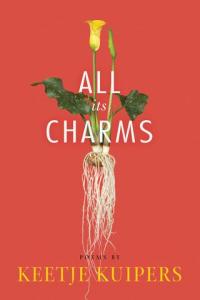 By turns tender and raw, these poems chronicle Kuipers’s decision to become a single mother by choice, her marriage to the woman she first fell in love with more than a decade before giving birth to her daughter, and her family’s struggle to bring another child into their lives. All Its Charms is about much more than the reinvention of the American family—it’s about transformation, desire, and who we can become when we move past who we thought we would be.
By turns tender and raw, these poems chronicle Kuipers’s decision to become a single mother by choice, her marriage to the woman she first fell in love with more than a decade before giving birth to her daughter, and her family’s struggle to bring another child into their lives. All Its Charms is about much more than the reinvention of the American family—it’s about transformation, desire, and who we can become when we move past who we thought we would be.
Keetje Kuipers is the author of three books of poems: Beautiful in the Mouth, The Keys to the Jail, and, most recently, All Its Charms, which includes poems honored by publication in both The Pushcart Prize and Best American Poetry anthologies.
Her poetry and prose have appeared in Narrative, Virginia Quarterly Review, The New York Times Magazine, The Believer, and over a hundred other magazines. Her poems have also been featured as part of the Academy of American Poets’ Poem-a-Day series and read on NPR. Keetje has been a Stegner Fellow, a Bread Loaf fellow, and PEN Northwest’s Margery Davis Boyden Wilderness Writing Resident. She lives with her wife and children on an island in the Salish Sea, a short ferry ride away from Seattle where she is Editor of Poetry Northwest.
(. . .)
I climbed the red rocks robed in their red dust.
I put the earth—all its charms—within me,
into each waiting pocket. Lip and ear.
What will happen when my body can no longer
hold this fragrant salt, its hardened tears,
inside? Let mine into the dirt. The names
I’ve chosen for my children are already fast
across the sky like the ochre feathers that frame
the blackbird’s shrug.
(. . .)
Fragment of ‘Landscape with Sage and the Names of My Children’
All Its Charms
By: Keetje Kuipers
Language: English
Paperback: 112 pages
Publisher: BOA Editions Ltd.
Publication Date: April 23, 2019
ISBN-10: 1942683766
ISBN-13: 978-1942683766
Regular price $ 17.00
# new poetry
Keetje Kuipers:
All Its Charms
• fleursdumal.nl magazine
More in: - Book News, Archive K-L, Archive K-L, Kuipers, Keetje, MODERN POETRY
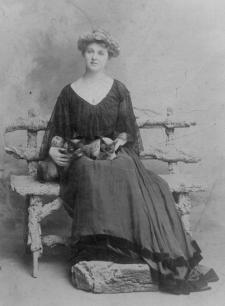
Victoire
Donne-moi tes baisers amers comme des larmes,
Le soir, quand les oiseaux s’attardent dans leurs vols.
Nos longs accouplements sans amour ont les charmes
Des rapines, l’attrait farouche des viols.
Repousse, délivrant ta haine contenue,
Le frisson de ma bouche éprise de ta chair.
Pour crier ton dégoût, dresse-toi, froide et nue,
Comme un marbre funèbre aux lueurs d’un éclair.
Tes yeux ont la splendeur auguste de l’orage…
Exhale ton mépris jusqu’en ta pâmoison,
O très chère ! — Ouvre-moi tes lèvres avec rage :
J’en boirai lentement le fiel et le poison.
J’ai l’émoi du pilleur devant un butin rare,
Pendant la nuit de fièvre où ton regard pâlit…
L’âme des conquérants, éclatante et barbare,
Chante dans mon triomphe au sortir de ton lit
Renée Vivien
born Pauline Mary Tarn;
(1877–1909)
Victoire;
Etudes et préludes
• fleursdumal.nl magazine
More in: Archive U-V, Archive U-V, Renée Vivien, Vivien, Renée
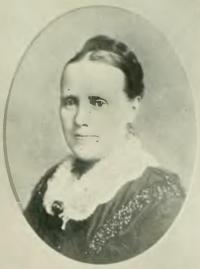
Maude.
A Ballad Of The Olden Time
Around the castle turrets fiercely moaned the autumn blast,
And within the old lords daughter seemed dying, dying fast;
While o’er her couch in frenzied grief the stricken father bent,
And in deep sobs and stifled moans his anguish wild found vent.
“Oh cheer thee up, my daughter dear, my Maude, he softly said,
As tremblingly he strove to raise that young and drooping head;
‘I’ll deck thee out in jewels rare in robes of silken sheen,
Till thou shalt be as rich and gay as any crowned queen.”
“Ah, never, never!” sighed the girl, and her pale cheek paler grew,
While marble brow and chill white hands were bathed in icy dew;
“Look in my face – there thou wilt read such hopes are folly all,
No garment shall I wear again, save shroud and funeral pall.”
“My Maude thou’rt wilful! Far away in lands beyond the sea
Are sunny climes, where winter ne’er doth wither flower or tree;
And there thou’lt journey with me, till I see thee smile once more,
And thy fair cheek wear the rose’s hue as in the days of yore.”
“Ah, no roses shall I gather beneath a summer sky,
Not for me such dreams, dear father, my end is drawing nigh;
One voyage is before me, ’tis no use to grieve or moan,
But that dark, fearful journey must I travel all alone.”
“My precious child! last of my race! why wilt thou grieve me so?
Why add by such sad words unto thy grey haired father’s woe?
Live – live, my pearl! my stricken dove! earth’s joys shall all be thine;
Whate’er thy wish or will through life, it also shall be mine.”
Fast coursed the diamond tear drops down that fair, though faded, cheek,
And she whispered, but so softly, one scarce could hear her speak:
“Ah! father, half those loving cares when summer bright was here
Would have kept thy daughter with thee for many a happy year.
“But, ah! thy heart was marble then, and to thy direst foe,
More stern, relentless anger thou couldst not, father, show.
What was my crime? The one I loved, not rich but nobly born,
Was loyal, true, on whom no man e’er looked with glance of scorn.
“He wooed me fairly, father dear, but thou did’st often swear
Thou’dst rather see me in my grave than bride to Hengist’s heir.
Reckless, despairing, he embarked upon the stormy main,
To seek an end to grief and care, nor sought he long in vain.
“Calm and untroubled sleeps he now beneath the salt sea brine,
And I rejoice to think how soon that sweet sleep shall be mine!”
No answer made the father but a low and grief-struck moan;
And silence reigned again throughout that chamber sad and lone.
Sudden the girl starts wildly, with bright and kindling eye,
Her cheek assumes a crimson tint like hue of sunset sky,
“Father! that voice, that rapid step, ah, me! they are well-known,
Hengist who comes from ocean’s deeps to claim me for his own!”
Say, does she rave? No. See yon form, with proud and gallant brow,
Bending above her, whisp’ring low, fond word and tender vow:
“Maude, my own love! no spectral form, no phantom’s at thy side,
But thy girlhood’s lover, now returned to claim thee as his bride.”
The story runs that love and youth o’er death the victory won,
And again did Maude, a happy wife, play ‘neath the summer sun,
While the old lord, grateful to the Power that Hengist’s life had spared,
Henceforth in all his children’s bliss, hopes, sorrows, fully shared.
Rosanna Eleanor Leprohon
(1829 – 1879)
Maude.
A Ballad Of The Olden Time
• fleursdumal.nl magazine
More in: Archive K-L, Archive K-L, CLASSIC POETRY
De schrijvers Ellen Deckwitz, Stephan Enter en Asha Karami zijn genomineerd voor de E. du Perronprijs 2019.
De prijs wordt toegekend aan schrijvers, kunstenaars of instellingen die met een cultuuruiting in brede zin een bijdrage leveren aan een inclusieve samenleving. De uitreiking vindt plaats op donderdagavond 16 april in de LocHal in Tilburg. Dan houdt Maxim Februari de negende E. du Perronlezing met als titel ‘E. du Perron en de pseudo-identiteiten’.
Ellen Deckwitz ‒ Hogere Natuurkunde (Uitgeverij Pluim)
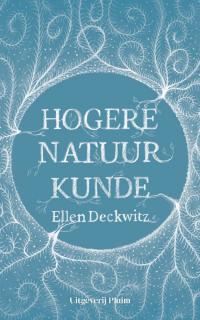 “Op een avond begon je te hijgen, greep naar je borst en riep dat je moest blijven ademen omdat ze anders hadden gewonnen.” Deze openingszin leidt een fascinerende en onheilspellende dichtbundel in, waarin verschillende genres, stemmen en stemmingen met elkaar worden verweven.
“Op een avond begon je te hijgen, greep naar je borst en riep dat je moest blijven ademen omdat ze anders hadden gewonnen.” Deze openingszin leidt een fascinerende en onheilspellende dichtbundel in, waarin verschillende genres, stemmen en stemmingen met elkaar worden verweven.
Aan het woord is een kleindochter die de stem van haar grootmoeder (1921-2014) laat klinken en haar ervaringen in de oorlog in Nederlands-Indië onder woorden probeert te brengen. Dat levensverhaal werd alleen in flarden verteld, in snippers overgeleverd. Dergelijke details geven een indruk van de overlevingsdrift van de grootmoeder als klein meisje, en van het pantser dat zij op latere leeftijd om zich heen heeft opgetrokken. De kleindochter verweeft haar stem met die van de ander en geeft ook een perspectief op de dochter/moeder (geboren in 1952) die tussen hen in staat. Zij houdt zich buiten het verhaal en overleeft door juist niet te vragen naar waar de pijn vandaan komt. Deckwitz schreef een indrukwekkende dichtbundel die laat zien hoe volgende generaties getekend worden door een land van herkomst dat in oorlog raakte en werd verwoest. Het leed en de veerkracht, soms ingewikkeld met elkaar verbonden, blijven bestaan ook in volgende generaties.
Stephan Enter ‒ Pastorale (Uitgeverij Van Oorschot)
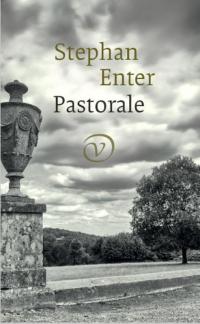 De roman Pastorale neemt ons mee naar de jaren tachtig, naar een fictief dorp, Brevendal, in het midden van Nederland. Het ene deel van het dorp is christelijk, de “Goede Herder en Zijn Kudde”, in het andere deel wonen “Ambonezen” die proberen de cultuur die ze verloren zijn vast te houden.
De roman Pastorale neemt ons mee naar de jaren tachtig, naar een fictief dorp, Brevendal, in het midden van Nederland. Het ene deel van het dorp is christelijk, de “Goede Herder en Zijn Kudde”, in het andere deel wonen “Ambonezen” die proberen de cultuur die ze verloren zijn vast te houden.
Het verhaal wordt verteld vanuit het perspectief van een broer en zus, opgegroeid in een oude familie met een groot en verwaarloosd landgoed. De roman laat zien hoe verschillende groepen naast elkaar leven, hoe stereotypische perspectieven van kracht zijn, en ook hoe de grenzen tussen de ene en de andere groep poreus blijken te zijn. Deze roman overtuigt omdat de beschrijvingen precies en gedetailleerd zijn, en er subtiel inzicht wordt geboden in de psychologie van de scholier Oscar, verliefd op een Moluks meisje, en zijn zus Louise, die een gesjeesde student is en onzeker over haar toekomst. Goede intenties hebben niet altijd een positief effect, mensen vatten uitspraken en ideeën vaak anders op dan werd bedoeld, en zo worden levens in de provincie geschilderd die veranderen en toch ook hetzelfde blijven. De roman is Perronesk in de veelzijdigheid van personages en in de dialogen waaruit uiteenlopende opvattingen naar voren komen. De meerstemmigheid van de roman wordt niet alleen bereikt door het aanvoeren van verschillende personages, maar zit ook in het hoofd van de enkeling, die haar eigen positie scherp probeert te krijgen: “Die stem – hadden andere mensen die ook? Hadden alle andere mensen die ook? En wat was ze, die stem – was je die zelf, of niet, of niet helemaal, of was je die alleen op momenten waarop je je niet van jezelf bewust was?” Pastorale is intellectueel, literair en uitermate boeiend.
Asha Karami ‒ Godface (Uitgeverij De Bezige Bij)
 Godface biedt veelzijdige, levendige, geestige en ook vaak verontrustende gedichten. Deze poëzie gaat over van alles, van schuldsanering tot Suikerfeest, van liposuctie tot Aviko-ovenfriet.
Godface biedt veelzijdige, levendige, geestige en ook vaak verontrustende gedichten. Deze poëzie gaat over van alles, van schuldsanering tot Suikerfeest, van liposuctie tot Aviko-ovenfriet.
Maar bovenal gaat deze poëzie over taal en hoe die als banaal en verheven instrument ingezet kan worden om dagelijkse beelden en ervaringen uit te drukken. Blog post discours en lyriek vermengen zich in absurde beschrijvingen: “ik ben geboren met twee vagina’s / en ik geloof niet in deuren / dit is al mijn derde dood en ik ben nog maar in mijn dertig.” De dichterlijke stem orkestreert het geheel, terwijl zij ook steeds verschillende perspectieven biedt en stemmingen oproept. Er is een sterke thematiek van verschil tussen culturen, groepen, werelden, een verschil dat volledig normaal wordt bevonden. Du Perron zei ooit dat zijn gewone bestaan zonder literatuur onbevredigd zou zijn. Die inzet lezen we ook hier: van alles is literatuur te maken en alles is te dragen omdat het in poëzie uitdrukking kan krijgen. De dichter is tegendraads en scherp analytisch. Dit is poëzie zonder diepzinnigheid of traagheid. Rauw en levendig, en daarmee bestendig in een tijd waarin alles op social media gezegd kan worden, zonder dat daar inzicht te vinden is: “de overweldigende zekerheid / van een ondanks alle zichtbare veranderingen / permanent onzichtbaar onderliggend landschap.”
Sinds 1986 reikt Tilburg University jaarlijks een prijs uit ‘ter bekroning van mensen of instellingen die zich middels een actieve bijdrage aan de cultuur verdienstelijk hebben gemaakt voor de bevordering van wederzijds begrip en een goede verstandhouding tussen de in Nederland woonachtige bevolkingsgroepen’. In de vele jaren dat de prijs bestaat, veranderde de universiteit haar naam van Katholieke Universiteit Brabant in Universiteit van Tilburg en vervolgens in Tilburg University, en veranderde de Faculteit der Letteren in de Faculteit voor Communicatie en Cultuur, vervolgens in Faculteit Geesteswetenschappen en uiteindelijk in Tilburg School of Humanities and Digital Sciences. De prijs echter draagt al meer dan twintig jaar dezelfde naam: die van de beroemde schrijver E. du Perron.
# Meer informatie op website: www.tilburguniversity.edu/duperronprijs
• fleursdumal.nl magazine
More in: Archive C-D, Archive E-F, Archive K-L, Awards & Prizes, Literary Events

Art
In placid hours well-pleased we dream
Of many a brave unbodied scheme.
But form to lend, pulsed life create,
What unlike things must meet and mate:
A flame to melt–a wind to freeze;
Sad patience–joyous energies;
Humility–yet pride and scorn;
Instinct and study; love and hate;
Audacity–reverence. These must mate,
And fuse with Jacob’s mystic heart,
To wrestle with the angel–Art.
Herman Melville
(1819 – 1891)
Art

• fleursdumal.nl magazine
More in: Archive M-N, Archive M-N, Herman Melville
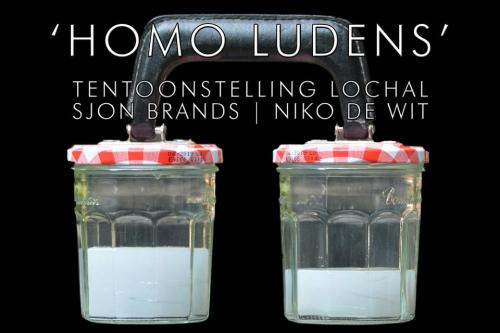
Tilburg is bij uitstek een stad van samenwerking. Aan de basis van het bloeiende culturele klimaat in deze stad bewegen zich talloze kunstenaars uit allerlei richtingen die met elkaar samenwerken, elkaar motiveren en inspireren. Hard nodig in deze tijd, waarin het voor nogal wat kunstenaars een kwestie van overleven is.
Ondanks uiteenlopende verschillen in hun werk hebben Niko de Wit en Sjon Brands elkaar gevonden. De Wit’s beelden zijn abstracter en doortrokken van elementaire vormen, Brands’ werk is herkenbaar aan onderdelen en eerder surrealistisch als geheel. Desondanks hebben zij elkaar getroffen in eenzelfde speelse gezindheid bij het maken van beelden.
 De tentoonstelling ‘Homo Ludens’ draait om de spelende mens, spelen als noodzakelijke voorwaarde voor beschaving, cultuur en kunst. Johan Huizinga’s magistrale werk ‘Homo Ludens’, onderscheidde de spelende mens als tegenhanger van de denkende mens (homo sapiens) en de werkende mens (homo faber).
De tentoonstelling ‘Homo Ludens’ draait om de spelende mens, spelen als noodzakelijke voorwaarde voor beschaving, cultuur en kunst. Johan Huizinga’s magistrale werk ‘Homo Ludens’, onderscheidde de spelende mens als tegenhanger van de denkende mens (homo sapiens) en de werkende mens (homo faber).
Hij benoemde spelen als fundament ván onze cultuur, als een ode aan vrijheid, alleen in vrijheid kan spel zich ontplooien en cultuur zich ontwikkelen. Spelen vereist, volgens Huizinga, concentratie, doelgerichte aandacht en vrijheid van beslommeringen. Onze hedendaagse samenleving met zijn massamedia verwart en versnippert daarentegen denken en activiteit, is niet meer in staat voor zichzelf een grote vorm of een leidend ideaal te vinden. Voor beide kunstenaars in deze expositie is spelen derhalve een ‘conditio sine qua non’ voor onderzoeken, ontdekken, oorspronkelijkheid, èn plezier.
Niko de Wit
Beeldhouwer Niko de Wit (Bergen op Zoom, 1948) viert dit jaar zijn vijftigjarig jubileum als beeldhouwer en is vooral bekend van zijn architecturale en monumentale werken. In Tilburg de ‘Dansende Schilpadden’ in de Muzentuin en de ‘Poort’ op Carré. Hoewel deze werken soms wat ernstig ogen, kenmerkt Niko’s ontwerpproces bovengenoemde grondhouding: spelen. Hij combineert inhoudelijk niet bij elkaar horende artefacten tot nieuwe, wat vervreemding oproepende, beelden. Via spelen met vormen, omkeren en experimenteren met gietprocessen. Als hij vertelt over zijn nieuwe oeuvre aan kleinschalige verrassende beelden in brons danst het plezier in zijn ogen.
Sjon Brands
Sjon Brands (Tilburg, 1948) is beeldend kunstenaar en maakt beelden uit gebruiksvoorwerpen en speelgoed, zoals dadaïstisiche paradijsvogels, grote flamboyante luchtschepen, ready-mades en satirische installaties van (protesterende) Barbie’s. Hij werkt niet vanuit vooraf bedachte concepten, zijn werk ontstaat uit het spelen met (onderdelen van) objecten die hij in de loop van de tijd heeft gevonden, verzameld of gekregen, uit het eindeloos combineren van verschillende vormen, omkeren, anders proberen, heel veel kijken en ook toeval. Spelen dus.
‘H O M O L U D E N S’
(de spelende mens)
tentoonstelling ‘LocHal’ Tilburg
1 maart t/m 31 augustus 2020
SJON BRANDS & NIKO DE WIT
absurdistische assemblages & bronstransformaties
plaats: ‘LocHal’, vitrines begane grond,
Burgemeester Brokxlaan 1000, 5041SG Tilburg
(achterzijde NS-station Tilburg-Centrum)
tijden: 1 maart t/m 31 augustus 2020,
open: ma/vr 8-22h, za 9-17h, zo 12-17h
• fleursdumal.nl magazine
More in: Art & Literature News, AUDIO, CINEMA, RADIO & TV, Exhibition Archive, FDM Art Gallery, Sjon Brands, Surrealism, Surrealisme, Theater van de Verloren Tijd

Brought together for the first time, here are 100 pieces of ‘Oulipo’ writing, celebrating the literary group who revelled in maths problems, puzzles, trickery, wordplay and conundrums.
Featuring writers including Georges Perec, Raymond Queneau and Italo Calvino, it includes poems, short stories, word games and even recipes. Alongside these famous Oulipians, are ‘anticipatory’ wordsmiths who crafted language with unusual constraints and literary tricks, from Jonathan Swift to Lewis Carroll.
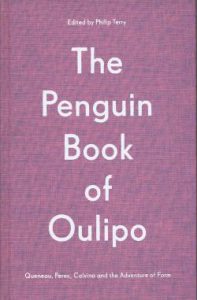 Philip Terry is a translator, and a writer of fiction and poetry. He has translated the work of Georges Perec, Stéphane Mallarmé and Raymond Queneau, and is the author of the novel tapestry, shortlisted for the Goldsmiths Prize.
Philip Terry is a translator, and a writer of fiction and poetry. He has translated the work of Georges Perec, Stéphane Mallarmé and Raymond Queneau, and is the author of the novel tapestry, shortlisted for the Goldsmiths Prize.
His poetry volumes include Oulipoems, Shakespeare’s Sonnets, Dante’s Inferno (a Times Literary Supplement Book of the Year, London Review Bookshop Book of the Week, and recipient of a Society of Authors Travelling Scholarship Prize), Quennets, and Dictator, a version of the Epic of Gilgamesh in Globish.
He is currently translating Ice Age signs from the caves at Lascaux.
• ‘Philip Terry’s collection is packed with fabulous, wide-ranging work that displays the full ingenuity, brio and originality of Oulipian ideals in action. An exhilarating feat of in-depth reading, and translating, it takes its place as the definitive anthology in English for decades to come.’ – Marina Warner
• Philip Terry’s playful selection will appeal to lovers of word games, puzzles and literary delights.
The Penguin Book of Oulipo
Queneau, Perec, Calvino and the Adventure of Form
Edited by Philip Terry
Imprint: Penguin Classics
Published: 31/10/2019
ISBN: 9780241378427
Hardcover
Length: 576 Pages
Dimensions: 240mm x 49mm x 162mm
RRP: £25.00
# new books
The Penguin Book of Oulipo
Queneau, Perec, Calvino and the Adventure of Form
Philip Terry (Edited by)
• fleursdumal.nl magazine
More in: #Archive Concrete & Visual Poetry, - Book Lovers, - Book News, - Objets Trouvés (Ready-Mades), Archive C-D, Archive O-P, Archive Q-R, Art & Literature News, AUDIO, CINEMA, RADIO & TV, Carroll, Lewis, Dadaïsme, Georges Perec, OULIPO (PATAFYSICA), Surrealisme, Swift, Jonathan
These never-before-published poems by Johnny Cash make the perfect gifts for music lovers and fans alike.
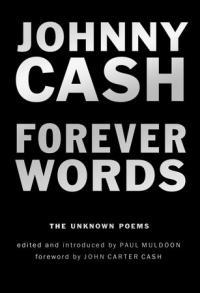 Edited and introduced by Pulitzer Prize-winning poet Paul Muldoon with a foreword by John Carter Cash, this poetry collection is illustrated with facsimile reproductions of Cash’s own handwritten pages. Now an album with music by Rosanne Cash, Brad Paisley, Willie Nelson, Kacey Musgraves, Elvis Costello, and more.
Edited and introduced by Pulitzer Prize-winning poet Paul Muldoon with a foreword by John Carter Cash, this poetry collection is illustrated with facsimile reproductions of Cash’s own handwritten pages. Now an album with music by Rosanne Cash, Brad Paisley, Willie Nelson, Kacey Musgraves, Elvis Costello, and more.
Since his first recordings in 1955, Johnny Cash has been an icon in the music world. In this collection of poems and song lyrics that have never been published before, we see the world through his eyes and view his reflection on his own interior reality, his frailties and his strengths alike. In his hallmark voice, he pens verses about love, pain, freedom, and mortality, and expresses insights on culture, his family, his fame, even Christmas. Forever Words confirms Johnny Cash as a brilliant and singular American literary figure. His music is a part of our collective history, and here the depth of his artistry and talent become even more evident.
JOHNNY CASH (1932–2003) was an American icon and country music superstar. He performed everywhere from Folsom State Prison to the White House. In 1980 he became the youngest living person to be chosen for the Country Music Hall of Fame; he was inducted into the Nashville Songwriters Hall of Fame in 1977, the Rock & Roll Hall of Fame in 1992, and the Gospel Music Hall of Fame in 2010. A recipient of the Kennedy Center Honors as well as the National Medal of Arts, he won nineteen Grammy Awards, four of them posthumously.
PAUL MULDOON is the author of twelve collections of verse, including Moy Sand and Gravel, for which he won the 2003 Pulitzer Prize for Poetry. He is the Howard G. B. Clark Professor at Princeton University, and between 1999 and 2004 he was Professor of Poetry at Oxford. Since 2007, Muldoon has been poetry editor of The New Yorker. He is a fellow of the Royal Society of Literature and of the American Academy of Arts and Letters.
Forever Words
The Unknown Poems
By Johnny Cash
Cat.: Poetry | Music
Paperback
$18.00
ISBN 9780399575150
144 Pages
Nov 12, 2019
Published by Plume
# new poetry
forever words
the unknown poems
by johnny cash
• fleursdumal.nl magazine
More in: # Music Archive, - Book News, Archive C-D, Archive C-D, Archive M-N, Art & Literature News, AUDIO, CINEMA, RADIO & TV
In Vrolijke verwoesting gaat Delphine Lecompte door waar ze gebleven was en tilt ze haar poëzie naar een volgend niveau.
 Andermaal is haar verbeelding grenzeloos, kijkt ze de waanzin recht in de ogen en worden haar gedichten bevolkt door talloze wonderlijke figuren, zoals de bedeesde zeepzieder, de mystieke chrysantenkweker en de analfabetische jongenshoer. En ook dit keer bezit haar droomachtige poëzie een expressieve taalkracht die zo groot is dat het effect betoverend is: wie één zin leest, zal zich niet meer kunnen losmaken uit dit fantastische universum.
Andermaal is haar verbeelding grenzeloos, kijkt ze de waanzin recht in de ogen en worden haar gedichten bevolkt door talloze wonderlijke figuren, zoals de bedeesde zeepzieder, de mystieke chrysantenkweker en de analfabetische jongenshoer. En ook dit keer bezit haar droomachtige poëzie een expressieve taalkracht die zo groot is dat het effect betoverend is: wie één zin leest, zal zich niet meer kunnen losmaken uit dit fantastische universum.
Delphine Lecompte (1978) debuteerde in 2004 in het Engels met de roman Kittens in the Boiler, daarna schakelde ze over naar gedichten in haar moedertaal. Voor haar debuutbundel De dieren in mij (2009) ontving ze de C. Buddingh’-prijs en de Prijs voor Letterkunde van de Provincie West-Vlaanderen. In 2015 verscheen Dichter, bokser, koningsdochter, dat genomineerd werd voor de VSB Poëzieprijs. Voor The Best of Delphine Lecompte (2018) selecteerde ze zelf de greatest hits uit haar rijke oeuvre, dat met Vrolijke verwoesting (2019) negen dichtbundels omvat.
‘Wie Lecompte leest weet waarom poëzie een wonder is.’ Menno Wigman
Delphine Lecompte
Vrolijke verwoesting
Gedichten
Nederlands
Paperback
Druk 1
September 2019
168 pagina’s
NUR code 306
EAN 9789403167107
Uitgever De Bezige Bij
€ 21,99
# new poetry
Delphine Lecompte
• fleursdumal.nl magazine
More in: #Editors Choice Archiv, - Book News, Archive K-L, Art & Literature News, Historia Belgica, Lecompte, Delphine, Wigman, Menno
Thank you for reading Fleurs du Mal - magazine for art & literature